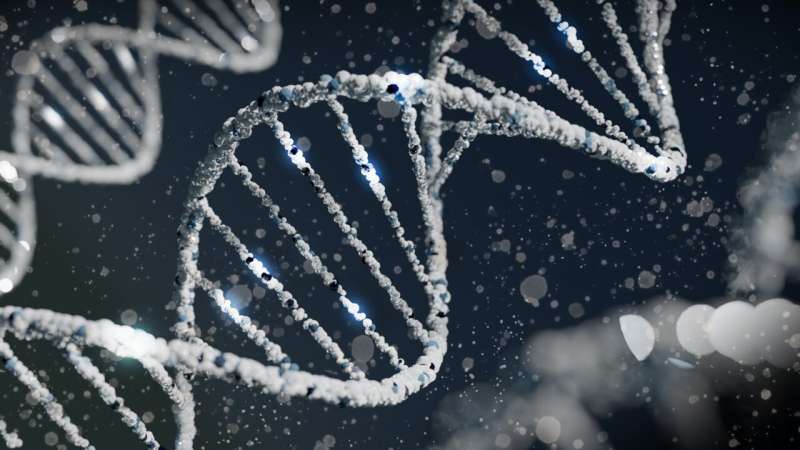This article has been reviewed according to Science X's editorial process and policies. Editors have highlighted the following attributes while ensuring the content's credibility:
fact-checked
peer-reviewed publication
trusted source
proofread
Host genetics helps explain childhood cancer survivors' mortality risk from second cancers

The population of childhood cancer survivors in the U.S. is increasing, with an overall childhood cancer survival rate greater than 85% five years after diagnosis. However, survivors can still be at increased risk of various health conditions, including second cancers.
Using data from the Childhood Cancer Survivor Study (CCSS) and the St. Jude Lifetime Cohort Study (St. Jude Life), scientists at St. Jude Children's Research Hospital have identified a genetic explanation for why a small proportion of survivors is more likely to develop second cancers and why these cancers may be more severe or deadly.
The findings, which will inform genetic counseling, testing and adoption of personalized cancer screening and prevention strategies, were published today in The Lancet Oncology.
The St. Jude group showed that survivors with pathogenic (damaging) genetic variants in specific genes, called cancer-predisposing variants, are at an increased risk of developing second (subsequent) cancers as adults, and those cancers are more likely to be severe and deadly.
The scientists had previously identified that survivors with pathogenic variants in one of 60 different cancer-predisposing genes or 127 DNA damage repair genes were more likely to experience a second or subsequent cancer. This study extends that research to show a direct connection between cancer-predisposing variants and increased second-cancer-related mortality.
Many of these genetic variants are known to be causally linked to cancers. For example, the tumor suppressor gene TP53 is one of the 60 genes included in the analysis. The key to the discovery's utility is that these variants are present in the DNA of patients when they are diagnosed with cancer as children, allowing for an individualized medicine approach to be developed early in life for each survivor.
By promoting better understanding of the effect such genes can have on future cancer risk and its outcome beyond the primary childhood cancer, the study will help inform efforts to prevent second cancers and improve the outcomes in these individuals.
"Our study pinpoints that clinical genetic testing to screen for and identify if survivors are carriers of these pathogenic variants could lead to screening and early interventions for those at higher risk to develop deadly second cancers, potentially saving their lives," said senior corresponding author Zhaoming Wang, Ph.D., St. Jude Department of Epidemiology and Cancer Control.
Cancer prevention in adult childhood cancer survivors
The total number of childhood cancer survivors who develop second or subsequent cancers is small (<10% based on current studies), and the percentage of survivors who carry cancer-predisposing variants is low (about 6%). Together, these factors have made it extremely challenging to study and understand the genetic risks for second cancers and their outcome in this population.
To reach statistically meaningful results, Wang and his collaborators combined whole genome/exome sequencing and clinical data from over twelve thousand survivors of childhood cancer. The study combined data from North America's two largest survivorship studies, the CCSS and St. Jude LIFE cohorts.
"This is the first comprehensive study looking for the genetic reason for late mortality—specifically late mortality due to second cancers," Wang said. "Now we know that cancer-predisposing variants contribute to the risk of death from second cancer."
Increased surveillance may help limit the impact of these cancer-predisposing variants as childhood cancer survivors grow into adulthood. By knowing which survivors are at greater risk, health care providers may be able to recommend personalized cancer screening, which may lead to the detection of additional cancers at their earliest and most treatable stage.
These variants are part of the inherited (germline) DNA with which people are born. This means they can be detected in children when they are first diagnosed with childhood cancers, arming survivors with the knowledge they need to lower their risk later in life.
"Even before finishing childhood cancer treatment, clinicians can recommend referral to do genetic counseling so that survivors with these variants can seek cancer prevention strategies later on," Wang said. "Depending on the gene harboring the variant, survivors that are carriers may be able to implement prevention strategies to safeguard their long-term health."
More information: The Lancet Oncology (2023).



















